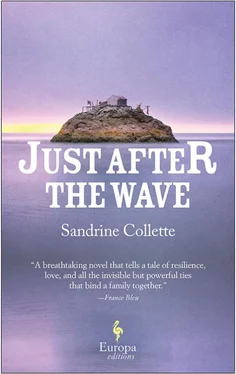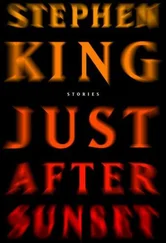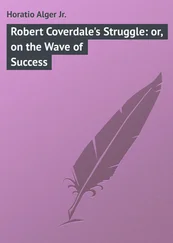“What?” asks Noah.
“The hens, we can’t leave them.”
“But… the cage will never fit.”
“No, no, we’ll take them without the cage.”
“Like that?”
“Loose, yes. They won’t go jumping in the water, will they.”
In the meanwhile, they gather all the eggs they can find, and add them to the ones that are left in spite of Ades’s appetite: Perrine boils them carefully then places them in a bag, there are sixty or so, which makes them feel better. I thought there’d be more , says Louie, nevertheless—but Ades ate so many just himself, and the hens themselves have been picking at them because of their hunger, the surface of the ground is no longer enough, they will have to keep a closer eye on them.
“And what are your hens going to eat on the boat?” asks Noah.
“We’ll see.”
A twelve-day trip, they recall.
They wrap up the pancakes Ades had set aside for himself.
“Serves him right,” murmurs Noah, feeling braver.
The boys take the cans of fuel from the barn and fill the fuel tank.
“Watch out, you’re spilling it,” says Noah.
Louie groans.
“It’s heavy.”
The two of them try to get the motor started. Perrine watches them from the shore. They pull on the starter rope, ten times, thirty times, their brows sweating.
“Stupid piece of crap!” shouts Noah.
“There must be something you have to do,” grunts Louie, checking the flywheel.
He lowers a lever, turns a knob.
“What’s that?” asks Noah.
Louie has no idea. But he’s the eldest, after all. So he tries it, he already heard Pata mention it.
“The choke.”
“Oh, right,” Noah agrees, not knowing what they’re talking about either.
Finally, the motor coughs to life, wheezing but regular. Then there’s the sound.
“It’s working!” shouts Louie.
He slaps Noah’s outstretched hand, then immediately switches off the motor. We have to save fuel for the trip. In the boat, he lashes down the extra fuel jug, and covers it with a sheet to protect it from the sun.
By noon they’re ready, and the boat is full. All that’s left is to load the hens, and the three of them, when the moment comes they hesitate, and gaze up at the house, their house, which they’re going to leave behind; no one can save it. They are overcome with sorrow, nostalgia for a dying world, the page they must turn on their childhood and their hopes, the island will disappear, and Pata didn’t come to get them. Saying nothing to each other, each one of them hopes they will see him on the sea, tonight, tomorrow, in two days’ time. If they didn’t believe that, they would probably not leave. The ocean frightens them, and the late August storms.
And something else: which way should they go?
A terrible question.
They don’t know the way to high ground. They just act as if—and no one talks about it.
Far to the east, Pata used to say. Louie remembers you have to head toward the sun in the morning. But only in the morning, because the stupid star doesn’t stay there in the east, it moves, it moves or the earth does, it doesn’t matter which one if the result is the same: if you row all day long with the sun on the horizon, by nightfall you’ll be back where you started, you’ll make a big useless loop, really, an endless journey. So, should you keep the sun on your left or on your right? Louie bites his lips: he has no idea. Maybe it doesn’t matter, as long as it’s at their back by nightfall.
But maybe it’s very important.
He goes over their supplies again, working out how many days they can last, not the twelve days of travel their father talked about, but the extra ones, for the unexpected, what if they get lost, no, they can’t, no matter how many times he counts, and plans for the tiniest portions of food, they cannot get lost, otherwise—otherwise what is the point of leaving, what is the point of getting their hopes up, what was the point of leaving Ades to drown after smashing his skull with the same oar Louie will be holding in his hands in just a few hours, or a few moments.
Sitting on a chair in the house, he puts his fingers on the globe and turns it slowly.
Where’s the sun, on this stupid globe? There’s not even any east. Nothing is indicated on it.
What am I supposed to do?
And anyway the world doesn’t look like this anymore. The blue color has swamped everything. With his index finger he traces the region where they are, there it is, to there. But east?
Fuck.
Louie shoves the globe away, exasperated. It hits a bump on the surface of the old oak table and rolls to one side; Louie just has time to stand up but not to reach for it, not to catch it, it lands with a loud, sharp shlack on the terra-cotta floor.
A tinkling of glass. The earth is on the ground, the globe shattered to pieces.
Inside, it’s hollow.
That’s it, they’re leaving. It’s two in the afternoon. The sun is baking.
“This way,” said Louie, when Noah looked at him questioningly.
Twenty-six hens, the rooster, and the three of them on the boat.
But Louie was wrong: when he starts the motor and the old machinery begins to hum, the hens jump in the water. They make it back to the island as best they can, those that jumped in right away. The others stay, the ones that didn’t dare, forced to remain once the land is too far away. They pace back and forth in the boat, squawking anxiously, wide-eyed, brushing up against the kids who look at them and wonder if these ones, too, won’t eventually make a run for it.
But gradually they calm down, lie down next to each other under the foredeck, where Louie spread some old hay from the chicken coop. They don’t like it, and they still squawk from time to time just to make their point. The rooster is there, too; Louie wishes that one had jumped overboard, too.
So now it’s eighteen hens and the three of them on the sea.
“Too bad for them,” says Noah, facing their island as it shrinks slowly from their field of vision.
The boat doesn’t go fast but they’re pleased all the same. Louie is holding the tiller, it seems so easy but he can’t keep the boat going straight, it zigzags this way and that like a drunken boat, What are you doing? says Perrine. Louie gets annoyed: “I’m trying!”
After a few minutes have gone by, he understands that he mustn’t try to keep an absolutely straight line, mustn’t keep adjusting their heading in order to go east, it makes it worse. They are moving slowly, the motor sometimes acts as if it is out of breath, spluttering, and yet they do seem to be gliding effortlessly over the water, the air on their faces red with sun and excitement. Noah bursts out laughing, drags one hand in the water, making bubbles and foam, he splashes Perrine and she cries out. Louie says nothing, his back to the island that is gradually fading behind them. Sometimes he closes his eyes for two or three seconds, and only opens them again when a sort of dizziness comes over him, he makes sure they are still heading in the right direction, the one he chose when they left, he prays there will be some sort of landmark on the sea sooner or later—another island, a mountain, a concrete pillar—something he can follow without worrying about drifting off course: then he’d be sure and could breathe easy at last. But nothing appears and he dreads the moment when their island will be gone for good, with no new country, no coast or cliff appearing on the other side. The nakedness of the ocean terrifies him. Water as far as the eye can see, not a root to cling to, no grass to look at, a fathomless desert, a liquid abyss. Oddly, this vastness oppresses him. Only their tiny boat, between earth and sky, is an acceptable refuge.
Читать дальше












